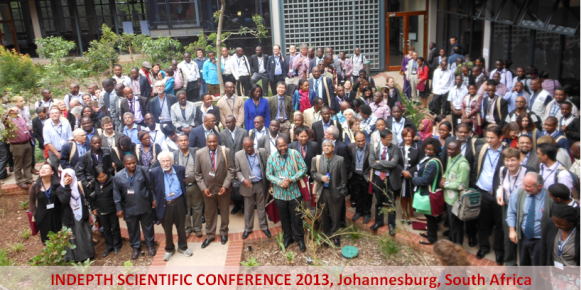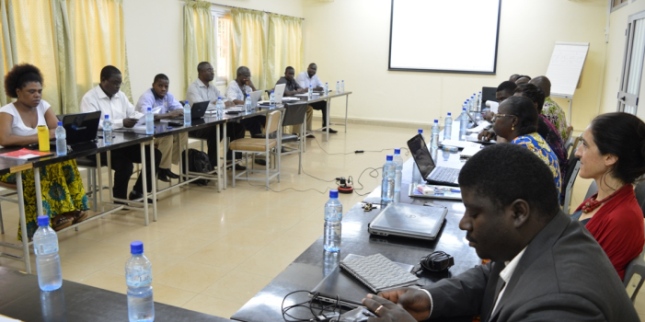| Dear Centre Leaders,
Greetings from the INDEPTH Secretariat. We hope you have had a good week.
We have the following items for your attention:
1. INDEPTH at Global Maternal Newborn conference
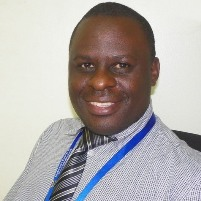 The Leader of the Maternal and Newborn Working Group of the INDEPTH Network, Dr. Peter Waiswa (pictured), represented INDEPTH at two key plenaries at the Global Maternal Newborn Health Conference (GMNHC) held in Mexico City from 18 – 21 October 2015. The Leader of the Maternal and Newborn Working Group of the INDEPTH Network, Dr. Peter Waiswa (pictured), represented INDEPTH at two key plenaries at the Global Maternal Newborn Health Conference (GMNHC) held in Mexico City from 18 – 21 October 2015.
This was the first technical conference after the adoption of the SDGs. The conference had three major themes: quality care, integration and equity.
Writing on “Achieving SDG targets for maternal, newborn and stillbirth: Does the world know what it takes?”, Dr. Waiswa notes that the SDGs are about everything but in health there is only one of 17 goals, Goal 3: Ensure healthy lives and promote well-being for all at all ages.
“Within this goal, there are targets for neonatal mortality (10 deaths per 1000 live births), stillbirths (10 per 1000 live births) and maternal mortality (70 deaths per 100,000 live births) to be achieved by all countries by 2030. These targets are even more ambitious (and challenging) than the MDG targets, yet the world is currently more economically constrained than before. So how will low-income countries manage the maternal and newborn related targets? Do they or does the global community know what it will take?” he writes. Read more
2. Two ministers to give addresses at ISC
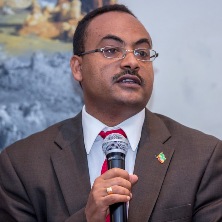 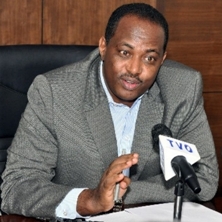 Two Ministers of the Federal Democratic Republic of Ethiopia will give Keynote addresses during the first day of the 2015 INDEPTH Scientific Conference (2015 ISC) in Addis Ababa, Ethiopia, on 11 November 2015. They are the Minister of Education H.E. Shiferaw Shigute (right) and Minister of Health H.E. Dr. Kesetebirhan Admasu (left). Also in attendance will be presidents of six universities in Ethiopia. Two Ministers of the Federal Democratic Republic of Ethiopia will give Keynote addresses during the first day of the 2015 INDEPTH Scientific Conference (2015 ISC) in Addis Ababa, Ethiopia, on 11 November 2015. They are the Minister of Education H.E. Shiferaw Shigute (right) and Minister of Health H.E. Dr. Kesetebirhan Admasu (left). Also in attendance will be presidents of six universities in Ethiopia.
The university presidents are namely Dr. Admassu Tsegaye (Addis Ababa University), Prof. Chemeda Fininsa (Haramaya University), Dr. Kindeya Gebrehiwot (Mekelle University), Dr. Takele Tadesse (University of Gondar), Dr. Berhanu Belay Abunie (Jimma University), Dr. Fekele Woldeyes (Arba Minch University).
A total of 31 Universities will send representatives at the ISC. One of the world's leading institutions, Stanford University in the US, will also be represented at the ISC by six faculty heads.
3. High rates of homicide in a rural South African population (2000–2008): findings from a population-based cohort study
 A study has shown that the high rates of homicide observed in a typical rural South African population – particularly among men – underscores the need for urgent interventions to reduce this tragic and theoretically preventable loss of life in this population and in similar South African settings. A study has shown that the high rates of homicide observed in a typical rural South African population – particularly among men – underscores the need for urgent interventions to reduce this tragic and theoretically preventable loss of life in this population and in similar South African settings.
The study titled “High rates of homicide in a rural South African population (2000–2008): findings from a population-based cohort study” was authored by George Otieno et al.
The INDEPTH Network provided financial support for the study.
Please find attached for details.
4. Mapping the environmental and socioeconomic coverage of the INDEPTH HDSS
A paper on INDEPTH has been published in the Pub Med (Health Place). The paper is titled “Mapping the environmental and socioeconomic coverage of the INDEPTH international health and demographic surveillance system network”.
The paper said results show that the current INDEPTH network architecture does a good job in representing environmental and socioeconomic (ES) conditions, but that great heterogeneities exist, even within individual countries.
The results provide valuable information in determining the confidence with which relationships derived from present HDSS sites can be broadly extended to other areas, and to highlight areas where the new HDSS sites would improve significantly the ES coverage of the network.
Read more
5. TWAS-DFG Cooperation Visits Programme
TWAS-DFG Cooperation Visits Programme: For postdoctoral researchers from sub-Saharan Africa, including South Africa, to go on a 'Cooperation Visit' lasting three months to an institute in Germany.
Deadline: 31 March 2016. Successful applicants will be informed three months after the deadline. Click for details
6. ISC/AGM 2015 Programme
Please view the draft programme of the ISC/AGM 2015 which will take place in Addis Ababa, Ethiopia from 11 – 14 November 2015 and kindly circulate. Note that we have scheduled special sessions for editors of world’s leading health and scientific journals. View here. |


 The Leader of the Maternal and Newborn Working Group of the INDEPTH Network, Dr. Peter Waiswa (pictured), represented INDEPTH at two key plenaries at the Global Maternal Newborn Health Conference (GMNHC) held in Mexico City from 18 – 21 October 2015.
The Leader of the Maternal and Newborn Working Group of the INDEPTH Network, Dr. Peter Waiswa (pictured), represented INDEPTH at two key plenaries at the Global Maternal Newborn Health Conference (GMNHC) held in Mexico City from 18 – 21 October 2015.
 Two Ministers of the Federal Democratic Republic of Ethiopia will give Keynote addresses during the first day of the 2015 INDEPTH Scientific Conference (2015 ISC) in Addis Ababa, Ethiopia, on 11 November 2015. They are the Minister of Education H.E. Shiferaw Shigute (right) and Minister of Health H.E. Dr. Kesetebirhan Admasu (left). Also in attendance will be presidents of six universities in Ethiopia.
Two Ministers of the Federal Democratic Republic of Ethiopia will give Keynote addresses during the first day of the 2015 INDEPTH Scientific Conference (2015 ISC) in Addis Ababa, Ethiopia, on 11 November 2015. They are the Minister of Education H.E. Shiferaw Shigute (right) and Minister of Health H.E. Dr. Kesetebirhan Admasu (left). Also in attendance will be presidents of six universities in Ethiopia.  A study has shown that the high rates of homicide observed in a typical rural South African population – particularly among men – underscores the need for urgent interventions to reduce this tragic and theoretically preventable loss of life in this population and in similar South African settings.
A study has shown that the high rates of homicide observed in a typical rural South African population – particularly among men – underscores the need for urgent interventions to reduce this tragic and theoretically preventable loss of life in this population and in similar South African settings.

